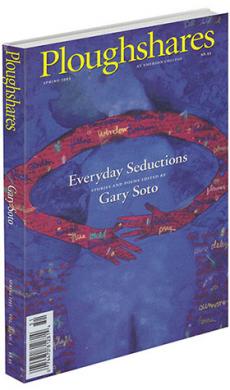rev. of Stonecutter’s Hand by Richard Tillinghast
The Stonecutter’s Hand
Poems by Richard Tillinghast. David R. Godine, $19.95 cloth. Reviewed by Diann Blakely Shoaf.
Eleven years after the publication of
Our Flag Was Still There, Richard Tillinghast has assembled a fourth full-length collection,
The Stonecutter’s Hand, that solidifies and deepens the considerable achievements of his earlier work. Tillinghast’s new volume of poems will be followed in a few months by his critical book on Robert Lowell, and while many of the best poems in
The Stonecutter’s Hand show the influence of Tillinghast’s former teacher, that influence has been masterfully assimilated.
In the book’s first eight poems, the reader is shuttled between locales as various as Turkey, Belgrade, and Dublin. The contemporary travel poem has received a great deal of well-deserved opprobrium in recent years, but Tillinghast escapes any personal and cultural solipsism — a major risk of the genre — through a historical sense that operates on both emotional and intellectual planes, and through a Bishopian gift for self-effacement. “Impedimenta of the self / Left behind somewhere,” begins Tillinghast in the volume’s opener, “Anatolian Journey”; his speaker’s luggage consists only of those items that will facilitate his immersion in an alien realm, such as “a bag with good straps, a book of Turkish proverbs, / Sandals of proven leather, / A bottle of water called, yes, ‘Life’ / In the language of the country.” But Tillinghast would slough off even further impedimenta, move beyond the language of the country to the language of the earth, which knows neither checkpoints nor border crossings: “in the
morning wake to / Acres of sunflowers / warmer than any human welcome; / Haystacks domed like the domes of whitewashed mosques, / And the Black Sea rising out of itself / like the fragrance of remoteness.”
As the volume’s use of traditional form makes clear, Tillinghast’s technical facility has matured into virtuosity. Of particular interest are his stanzaic poems which represent variations on the six-line “Venus and Adonis” stanza, rime royal, ottava rima, and Spenserian stanza. Tillinghast displays in “Abbey Hill” and “Passage,” to mention only two, an earned canniness as regards the melding of form with content. What form could better suit a recounting of the pulling down of an Anglo-Irish great house than rime royal, its very name seeming brutally ironic in the context of the poem’s subject matter? And what better than ottava rima to recall another of Tillinghast’s tutelary spirits, Yeats, who is paid homage in several poems, among them the piece from which
The Stonecutter’s Hand carves its title? Tillinghast’s most stellar accomplishment in form, however, is perhaps an unconscious one. In poem after poem modeled on the historical English stanzas, he changes the pattern of lines which would conventionally follow an
abab pattern to
abba, and the formal allusion to the “In Memoriam” stanza splendidly but subtly emphasizes the elegiac undercurrents of
The Stonecutter’s Hand.
The Irish are notorious sentimentalists, and after a year spent in Galway, it’s probably to Tillinghast’s credit that his emotional rein goes slack only a time or two in this new collection. Yeats’s insistence on packing the rawest of feelings in ice and salt is probably an influence here, as well as the muscular exactitude of language for which Lowell is justly famous, especially in those triple adjectives: “flabby, bald, lobomotized” is transformed by Tillinghast’s native music to a phrase like “toppling, armorial, hierarchic.” Yet sentimentality can also take the form of cynicism, and while Tillinghast is mercilessly self-confronting and self-questioning in the journey represented by
The Stonecutter’s Hand, his final stance is one of a Heaneyesque attention to the world’s numinousness. But an attention purely American, purely Tillinghast’s own.
Diann Blakely Shoaf is a frequent reviewer for the “Bookshelf.” Her collection of poems, Hurricane Walk,
was published by BOA Editions in 1992.

